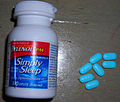Sleep induction
Sleep induction refers to the deliberate effort to bring on sleep using various techniques or medicinal means. It is practiced to lengthen periods of sleep, increase the effectiveness of sleep, and to reduce or prevent insomnia.
Techniques
There are several non-pharmacological techniques for sleep induction, including:
- Relaxation techniques: Methods such as progressive muscle relaxation, deep breathing exercises, and meditation can help to calm the mind and body, making it easier to fall asleep.
- Cognitive-behavioral therapy (CBT): CBT for insomnia focuses on identifying and changing negative thoughts and behaviors related to sleep, as well as developing healthy sleep habits.
- Sleep hygiene: Creating a comfortable sleep environment, establishing a regular sleep schedule, and avoiding stimulating activities before bedtime can improve sleep quality and make it easier to fall asleep.
- Sleep restriction: Limiting time spent in bed to the amount of sleep actually needed can help consolidate sleep and make it easier to fall asleep.
- Stimulus control: Associating the bed and bedroom with sleep and relaxation, rather than activities like watching television or working, can help to reinforce the connection between sleep and the sleep environment.
- Sleep aids: Listening to calming music, using white noise machines, or engaging in other relaxing activities can help to create an environment that is conducive to sleep.
Medicinal means
Pharmacological methods for sleep induction include:
- Over-the-counter sleep aids: These medications typically contain antihistamines that cause drowsiness, such as diphenhydramine or doxylamine succinate.
- Prescription sleep medications: Healthcare professionals may prescribe medications like zolpidem, eszopiclone, or ramelteon to help induce sleep. These medications should be used under the guidance of a healthcare professional and for a limited time.
- Melatonin: Melatonin is a hormone that helps regulate sleep-wake cycles. Melatonin supplements can be used to help adjust the body's internal clock, particularly in cases of jet lag or shift work.
- Herbal remedies: Some people find that herbal remedies, such as valerian root, chamomile, or passionflower, help to promote sleep.
Risks and considerations
While sleep induction techniques and medications can be beneficial for those struggling with insomnia or other sleep disturbances, it is important to use them responsibly and under the guidance of a healthcare professional. Prolonged use of sleep aids can lead to dependence, tolerance, and potential side effects. It is essential to address the underlying causes of sleep disturbances and to practice good sleep hygiene for long-term sleep health.
| This article is a medical stub. You can help WikiMD by expanding it! | |
|---|---|
Transform your life with W8MD's budget GLP-1 injections from $125.
W8MD offers a medical weight loss program to lose weight in Philadelphia. Our physician-supervised medical weight loss provides:
- Most insurances accepted or discounted self-pay rates. We will obtain insurance prior authorizations if needed.
- Generic GLP1 weight loss injections from $125 for the starting dose.
- Also offer prescription weight loss medications including Phentermine, Qsymia, Diethylpropion, Contrave etc.
NYC weight loss doctor appointments
Start your NYC weight loss journey today at our NYC medical weight loss and Philadelphia medical weight loss clinics.
- Call 718-946-5500 to lose weight in NYC or for medical weight loss in Philadelphia 215-676-2334.
- Tags:NYC medical weight loss, Philadelphia lose weight Zepbound NYC, Budget GLP1 weight loss injections, Wegovy Philadelphia, Wegovy NYC, Philadelphia medical weight loss, Brookly weight loss and Wegovy NYC
|
WikiMD's Wellness Encyclopedia |
| Let Food Be Thy Medicine Medicine Thy Food - Hippocrates |
Medical Disclaimer: WikiMD is not a substitute for professional medical advice. The information on WikiMD is provided as an information resource only, may be incorrect, outdated or misleading, and is not to be used or relied on for any diagnostic or treatment purposes. Please consult your health care provider before making any healthcare decisions or for guidance about a specific medical condition. WikiMD expressly disclaims responsibility, and shall have no liability, for any damages, loss, injury, or liability whatsoever suffered as a result of your reliance on the information contained in this site. By visiting this site you agree to the foregoing terms and conditions, which may from time to time be changed or supplemented by WikiMD. If you do not agree to the foregoing terms and conditions, you should not enter or use this site. See full disclaimer.
Credits:Most images are courtesy of Wikimedia commons, and templates, categories Wikipedia, licensed under CC BY SA or similar.
Contributors: Prab R. Tumpati, MD




